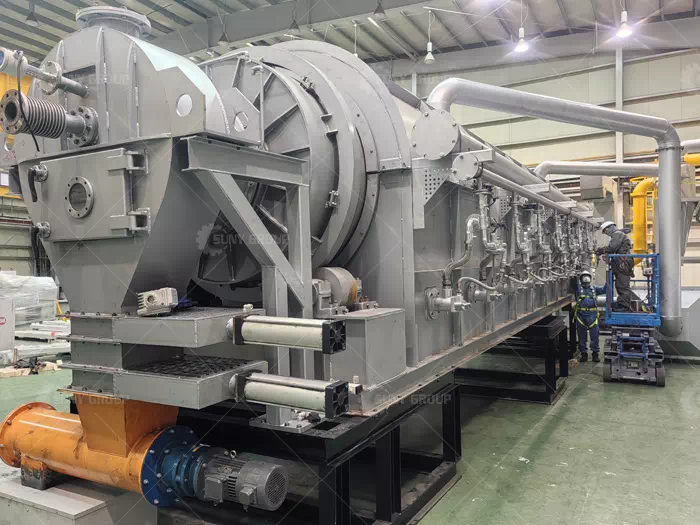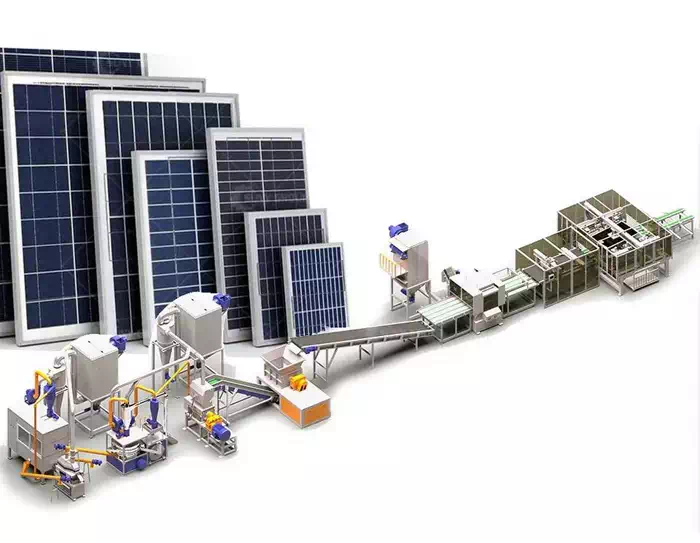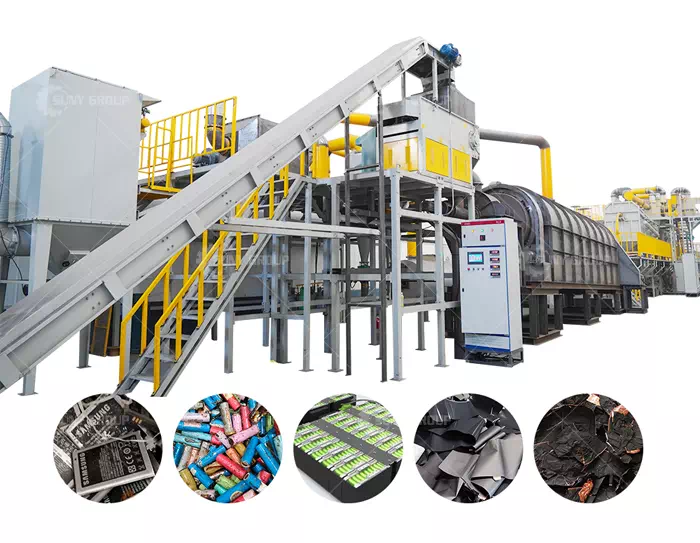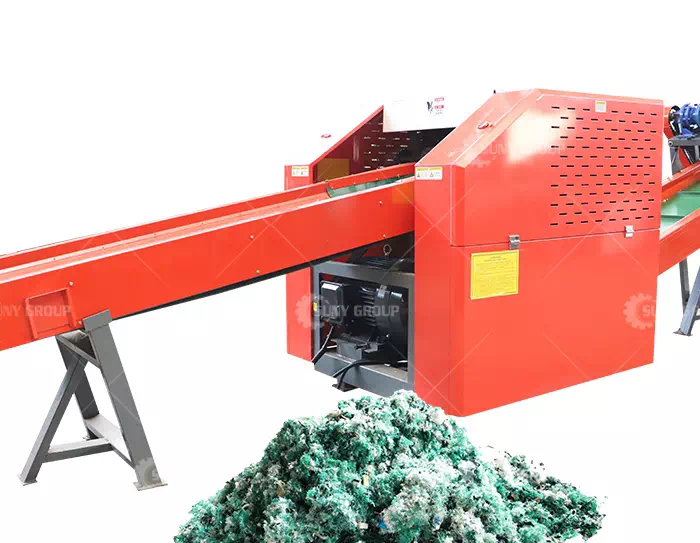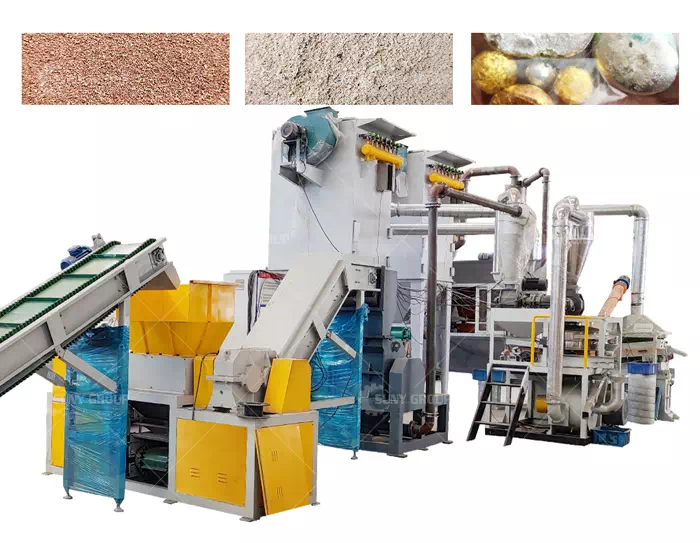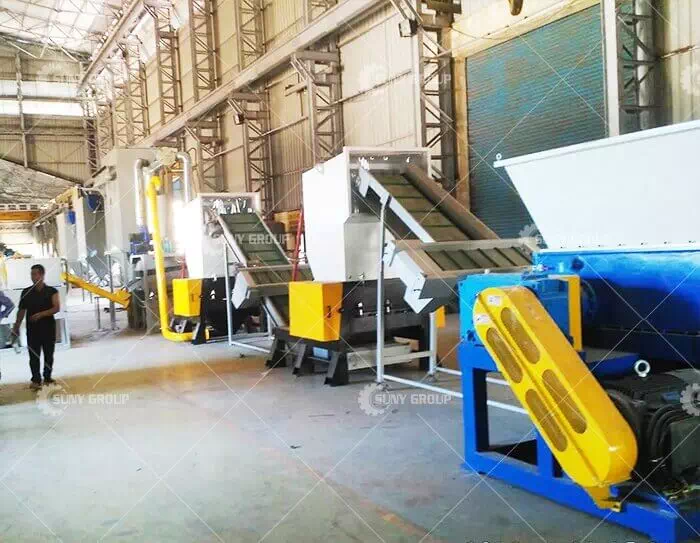Lithium-ion Battery End-of-life Recycling Facility
With the wide application of lithium-ion batteries worldwide, the management of their end-of-life cycle is becoming more and more prominent. To cope with the environmental and resource problems in the recycling of lithium batteries, it is essential to build an effective end-of-life cycle recycling facility for lithium batteries. This can not only reduce the negative impact on the natural environment but also maximize the recovery of valuable metal resources, such as lithium, nickel, cobalt, etc., to achieve the recycling of resources and promote the development of the green economy.
The role and process of scrap lithium battery crushing equipment
In the lithium battery recycling process, crushing equipment is one of the key links. Waste lithium batteries after crushing equipment, the battery shell, internal metal, and other components can be separated, laying the foundation for the subsequent purification and reuse steps.
The specific process includes first pre-treatment of lithium batteries, and removal of the external wires, interfaces, and other appendages; then the battery is sent to the crusher, through mechanical shear and the impact will be broken down into smaller pieces. The crushed material is usually preliminarily categorized through a screening system to extract the metal and plastic parts respectively, ensuring the efficiency and accuracy of the subsequent processing.
Role and process of sorting equipment
In lithium battery recycling, sorting equipment plays the role of “accurate separation” to ensure that all kinds of materials can be effectively separated and reused after crushing. Common sorting equipment, including magnetic separators, electromagnetic separators, wind separators, etc., can be based on the physical properties of different materials (such as magnetism, electrical conductivity, and density) for separation.
The workflow of the sorting equipment is usually to send the crushed material into the magnetic separator, first of all, to separate the iron materials in it; then through the electromagnetic sorting machine, to separate the more conductive metals, such as copper, aluminum, etc.; and finally using the wind separator, according to the difference in density of the material, the lightweight plastics and heavy metal particles are further separated.
The role and process of carbonization recycling of end-of-life lithium battery carbonization furnace
Carbonization recovery is another important part of lithium battery recycling. The carbonization furnace heats the end-of-life lithium batteries at high temperatures to decompose the organic substances (such as electrolytes, binders, etc.) inside them into reusable carbide and gas. This not only can effectively reduce the volume of waste but also can further recover the valuable elements in the lithium battery.
The specific flow of the carbonization process is: firstly, the scrapped lithium battery fragments are put into the carbonization furnace, and heated to decompose by using the anaerobic or low-oxygen environment; as the temperature rises, the organic matter inside the battery is gradually transformed into carbide, while the metal components are retained in the slag. Eventually, the gas purified by the gas treatment system can be utilized as energy, and the carbide can be further processed to extract the metal components therein, realizing closed-loop recycling.
The latest machine and equipment technology
With the development of science and technology, lithium battery recycling equipment technology is also constantly updated and iterative. The latest recycling equipment puts more emphasis on automation, intelligence, and environmental performance. For example, intelligent crushing equipment can automatically adjust the shear strength to adapt to different types of lithium batteries and reduce the generation of dust; advanced sorting equipment is integrated with sensor technology, which can more accurately identify different materials and improve sorting efficiency.
In addition, modern carbonization furnaces have been equipped with higher energy efficiency and exhaust gas treatment capabilities to ensure that the environmental impact is minimized during the recycling process. The application of these technologies not only improves the economic efficiency of recycling but also provides strong support for the sustainable development of the industry.
Funding and Investment Issues
Despite the favorable social and environmental benefits of lithium battery recycling, the issue of funding and investment remains one of the major challenges to the development of the industry. The construction of efficient lithium battery recycling facilities requires a large amount of upfront investment, including equipment purchase, plant construction, and personnel training. In addition, the operating costs of the recycling process, such as energy consumption and waste gas treatment costs, cannot be ignored.
To cope with these problems, many countries and regions have begun to launch supportive policies to encourage enterprises to participate in investment in the field of lithium battery recycling. For example, the government provides subsidies or tax breaks to reduce the investment risk of enterprises; at the same time, the capital market is gradually focusing on the potential of lithium battery recycling, and several investment funds focusing on environmental protection and circular economy have emerged.
Lithium Battery Recycling Facility for Korean Customers
Innovative solutions and countermeasures
In the face of the above challenges, innovative solutions have become the key to promoting the development of the lithium battery recycling industry. On the one hand, research and development of low-cost, high-efficiency recycling equipment and technology can significantly reduce the threshold of entry into the industry; on the other hand, the establishment of regional recycling networks, and promote cooperation between enterprises, governments, and scientific research institutions, can effectively improve the overall recycling efficiency of the industry. As a professional lithium battery recycling solution, SUNY GROUP has a wealth of experience and perfect technical equipment, and has reached cooperation with customers in many countries around the world, if you need, welcome to contact us at any time to consult.
Recommend products
CONTACT US:
If you have any requirement or suggestion, please fill in the form and send to us, thanks!E-mail:sunymachine@gmail.com | Whatsapp:+8613674945231


